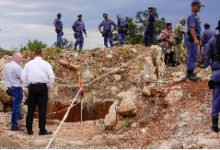Ethiopia resumes filling Nile dam reservoir

Ethiopia has started the second phase of filling the reservoir of its mega-dam on the upper Blue Nile, Egypt and Sudan said, raising tensions Tuesday ahead of an upcoming UN Security Council meeting on the divisive project.
Both Cairo and Khartoum said they had been notified by Addis Ababa that the second phase of filling had begun at the Grand Ethiopian Renaissance Dam (GERD).
Egypt’s irrigation ministry late Monday expressed its “firm rejection of this unilateral measure” and Sudan’s foreign ministry on Tuesday followed suit, labelling the move a “risk and imminent threat”.
In Addis Ababa, the offices of Prime Minister, Abiy Ahmed, and Irrigation Minister, Seleshi Bekele, did not respond to AFP’s requests for comment.
The huge dam, set to be Africa’s largest hydroelectric project when completed, has sparked an almost decade-long diplomatic stand-off between Addis Ababa and downstream nations, Egypt and Sudan.
Ethiopia said the project was essential to its development, but Cairo and Khartoum fear it could restrict their citizens’ water access.
Both governments have been urging Addis Ababa to sign a binding deal over the filling and the dam’s operations, calling on the UN Security Council to take up the matter.
Thursday’s Security Council meeting was requested by Tunisia on behalf of Egypt and Sudan, a diplomatic source told AFP.
But France’s ambassador to the UN said last week that the council itself can do little apart from bringing all the sides together and “encouraging them to get back to the negotiations”.
Tunisia has also submitted a draft resolution calling on Ethiopia to cease filling the reservoir, diplomatic sources said Tuesday.
The text, obtained by AFP, called on the three countries to resume negotiations and to finalise the details of an agreement on filling within six months.
It urged the “three countries to refrain from making any statements, or taking any action that may jeopardize the negotiation process, and urged Ethiopia to refrain from continuing to unilaterally fill the GERD reservoir.”
No date has been set for the draft resolution vote and diplomatic sources have said it is unlikely it will be as early as Thursday’s meeting.
Egyptian Foreign Minister, Sameh Shoukry, said in an earlier note to the UN that negotiations were at an impasse, and accused Ethiopia of adopting “a policy of intransigence that undermined our collective endeavours to reach an agreement.”
Shoukry and his Sudanese counterpart, Mariam al-Mahdi, met in New York ahead of the Security Council talks and reiterated their “firm rejection” of Ethiopia’s move, Cairo said.
Relations between Cairo and Addis Ababa have been icy over the past decade, while tensions have also risen between Ethiopia and Sudan as the Tigray conflict has sent refugees fleeing across the border into Sudan.
Addis Ababa had previously announced it would proceed to the second stage of filling in July, with or without a deal.
Ethiopia argued that adding water to the reservoir, especially during the months of July and August which typically enjoyed heavy rainfall, was a natural part of the construction process.
Egypt, which depends on the Nile for about 97 percent of its irrigation and drinking water, sees the dam as an existential threat.
Sudan hopes the project will regulate annual flooding but fears its own dams would be harmed without agreement on the Ethiopian operation.
The 145-metre (475-foot) tall mega-dam, construction of which began in 2011, has a reservoir with a total capacity of 74 billion cubic metres (2.61 trillion cubic feet).
Filling began last year, with Ethiopia announcing in July 2020, it had hit its target of 4.9 billion cubic metres — enough to test the dam’s first two turbines.







